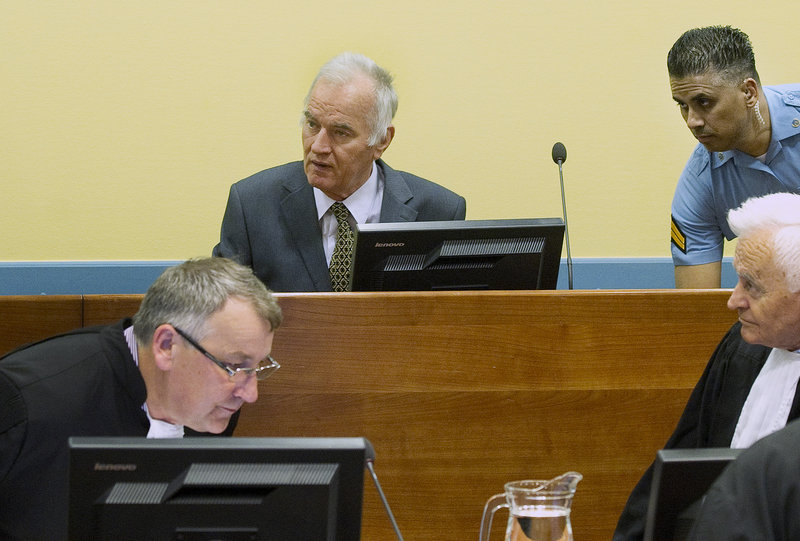THE HAGUE, Netherlands – He’s no longer the swaggering general who held Sarajevo “in the palm of his hand” during Bosnia’s 1992-95 war. Yet as his long-awaited genocide trial began Wednesday, Ratko Mladic still managed to reopen old wounds with the flick of his hand.
Hobbled by strokes and wearing a business suit instead of combat fatigues, the frail, 70-year-old defendant had an angry exchange of hand gestures with the families of massacre victims in the public gallery, separated by the bulletproof glass in the courtroom.
“Vulture!” said one woman in the gallery.
Watching the war crimes trial on television in Bosnia, Mevlija Malic added: “Not even an animal would behave like that.”
Mladic is accused of commanding Bosnian Serb troops who waged a campaign of murder and persecution to drive Muslims and Croats out of territory they considered part of Serbia. His troops rained shells and snipers’ bullets down on civilians in the 44-month-long siege of the Bosnian capital, Sarajevo, and killed 8,000 Muslim men and boys in Srebrenica in July 1995, Europe’s worst massacre since World War II.
“The world watched in disbelief that in neighborhoods and villages within Europe a genocide appeared to be in progress,” prosecutor Dermot Groome said at the U.N. court in The Hague.
Twenty years after the war that left 100,000 dead, Bosnia remains divided into two ministates — one for Serbs, the other shared by Bosnian Muslims and Croats — linked by a central government.
Mladic fled into hiding after the war and spent 15 years as a fugitive before international pressure on Serbia led to his arrest last year. Now he is held in a special international wing of a Dutch jail and receives food and medical care that would likely be the envy of many in Bosnia.
But the fact that he is jailed and on trial is seen as another victory for international justice and hailed by observers as evidence that — more often than not — war crimes tribunals get their indicted suspects, even if years later. In another court Wednesday in The Hague, former Liberian President Charles Taylor faced a sentencing hearing after being convicted last month of aiding rebels in neighboring Sierra Leone’s civil war.In a demonstration of Bosnia’s continuing ethnic divide, Mladic’s entrance in court was applauded by people who gathered in the Serb stronghold of Pale to watch the trial on TV.
“Mladic is our hero. It’s sad that we see him there,” said Milan Ivanovic, a 20-year-old law student.
Groome told the three-judge panel that Mladic was hand-picked by Bosnian Serb leader Radovan Karadzic because of his skills as a military commander, but also “because Karadzic believed he was willing to commit the crimes needed to achieve the strategic goals of the Bosnian Serb leadership.”
He signaled that prosecutors would use Mladic’s own words against him in the trial, drawing on Mladic’s wartime diaries, radio intercepts and appearances on television during the war.
Send questions/comments to the editors.



Success. Please wait for the page to reload. If the page does not reload within 5 seconds, please refresh the page.
Enter your email and password to access comments.
Hi, to comment on stories you must . This profile is in addition to your subscription and website login.
Already have a commenting profile? .
Invalid username/password.
Please check your email to confirm and complete your registration.
Only subscribers are eligible to post comments. Please subscribe or login first for digital access. Here’s why.
Use the form below to reset your password. When you've submitted your account email, we will send an email with a reset code.